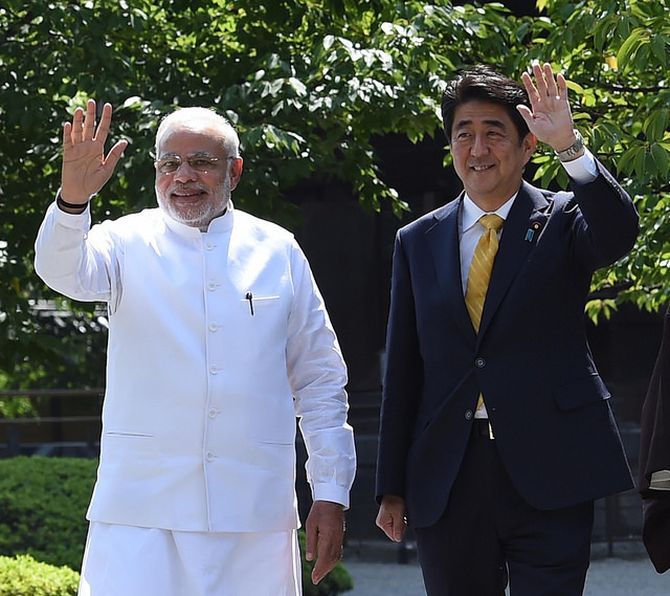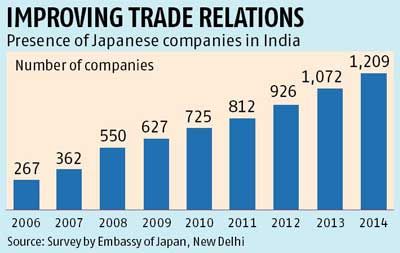DIPP had set up Japan Plus to facilitate and fast-track investment proposals from Japan.

Every morning, a small group of officials in the department of industrial policy and promotion (DIPP) gets calls, or representations, from three-to-five Japanese companies already operating, or planning to operate, in India.
The issues the Japanese firms raise relate to the existing Japanese investment or the ones in pipeline, and what they expect from the Indian government. By afternoon, however, the issues are already flagged with the officials concerned in DIPP or at least set in motion for being taken up with other ministries.
This team is called Japan Plus, created in October last year to promote greater Japanese investments in India.
Budget 2015: Complete Coverage
The advantage of sitting right inside the premises of a government department is more than only convenience.
“Promotion and troubleshooting are two pillars of the initiative,” said a Japanese official familiar with the working of Japan Plus. Neither is such a cell in existence for any other country in India nor do the Japanese have such a team placed in any government.
DIPP had set up Japan Plus to facilitate and fast-track investment proposals from Japan. It has representatives from the Indian government and METI (Ministry of Economy, Trade and Industry), Japan.
An outcome of Prime Minister Narendra Modi’s visit to Japan last year, the Japan Plus team works on a mandate that runs through the entire spectrum of investment promotion – research, outreach, promotion, facilitation and aftercare. The team initiates, attracts, facilitates, fast-tracks, and handholds Japanese investments across sectors.
Though initially the Japanese side was hoping to have this cell placed in the Prime Minister’s Office (PMO), eventually, it was placed in DIPP. “The outreach is better but there is a problem of hierarchy.
If there are issues that concern other ministries, sitting in DIPP, it cannot be tackled easily since the two departments are on equal footing. Had Japan Plus been in the PMO, the situation would have been different,” said an official working with Japanese companies.
 One such issue relates to tax in which DIPP has no role, but has to be directed to the Department of Revenue in the finance ministry.
One such issue relates to tax in which DIPP has no role, but has to be directed to the Department of Revenue in the finance ministry.
When Japan Plus was created, identifying prospective Japanese companies, including small and medium enterprises (SMEs), and facilitating their investments in India, were the priorities. The Japanese side is, therefore, focusing on bringing in mid-sized companies into India for servicing requirements of bigger players such as Sansui, Hitachi and Suzuki.
“To facilitate such ancillary units, setting up industrial parks is important since these companies have limited resources. Many Japanese companies are, therefore, looking at hiring factory space instead of constructing themselves,” said an official who did want to be quoted.
The team is currently in talks with various state governments for setting up industrial parks with an eye on getting Japanese investment. Discussions with Rajasthan, Gujarat, Madhya Pradesh, Maharashtra and Tamil Nadu have already been held.
During Modi’s visit, Japanese prime minister Shinzo Abe had set a target of 3.5 trillion yen ($33.5 billion) of public and private investment and financing from Japan including official development assistance to India to be made over five years.
There are already 1,209 Japanese firms operating in India out of which 137 have started their operations after October 2013.
Japan is the fourth largest foreign direct investment (FDI) contributor to India, with major interests in pharmaceuticals, automobiles, and services sectors accounting for 7.46 per cent of total FDI equity inflows into India. During April 2000-November 2014, FDI from Japan into India stood at $17.55 billion.
Under the Tokyo Declaration for Japan-India Special Strategic and Global Partnership, Modi and Abe have set a target of doubling Japanese FDI and the number of Japanese firms in India by 2019.
However, the Japanese authorities have stated this will happen only when “there is significant improvement in India’s tax regulations”.
When the two leaders met on the sidelines of the G20 meeting, Abe had expressed serious concerns over imposing the minimum alternate tax on special economic zones.
The creation of Japan Plus might be a unique initiative in itself, but its success will count on how far the DIPP is able to push its agenda with other ministries and state governments.


.jpg)








